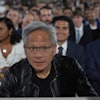WASHINGTON (PRNewswire-USNewswire) — Today's announcement by the World Trade Organization (WTO) that the United States continues to violate WTO rules could pave the way for Canada and Mexico to immediately seek billions of dollars' worth of retaliatory tariffs against U.S. products including wine. This is the third time that the WTO has ruled that U.S. country of origin labeling (COOL) of certain meat products is discriminatory and violates WTO rules.
"Retaliation by Canada and Mexico would do hundreds of millions of dollars in damage to U.S. wine exports and is simply unacceptable," said Robert P. (Bobby) Koch, President and CEO of Wine Institute. "In Canada, it has taken decades to build the market for U.S. wine and it could be irreparably harmed in an instant if Congress does not act." Without Congressional action to bring the U.S. into WTO compliance on COOL, Canada and Mexico could be in a position to retaliate against U.S. products as early as this summer.
U.S. wine producers export more than $500 million of wine to Canada and Mexico annually and Canada is now the single largest export market for U.S. wine. Wine Institute recently announced that U.S. wines for the first time ever surpassed wines from France and Italy to claim the largest share of the Canadian market. Any disruption caused by new retaliatory tariffs would result in a significant loss of market share that would take years to recover.
Wine Institute represents 1,000 wineries and affiliated businesses from throughout California, the number one wine producing state. Wine Institute is also an active member of the COOL Reform Coalition, a diverse group of associations and companies that represent U.S. food, agriculture and manufacturing industries that advocates U.S. compliance with WTO obligations.






















